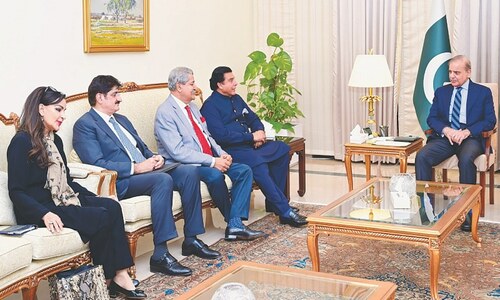ISLAMABAD, July 27: The government is considering a proposal to reduce the deemed duty, dealer commission and oil companies’ margin on all petroleum products by 25 to 50 per cent from the existing level and then freeze them.
Informed sources told Dawn that the government had firmed up its plan about cuts in the three crucial heads of the oil pricing mechanism that could reduce current prices of different products by Rs4-6 per litre or reduce the subsidy being paid out of taxpayers’ money to oil marketing companies and refineries.
Under the plan, the deemed duty will be trimmed by 50 per cent and the dealer commission and OMC margin by 25 per cent. Finance Minister Syed Naveed Qamar and a team of officials of the petroleum and finance ministries would discuss the move on Monday in Karachi with the oil industry, including dealers, refineries and OMCs separately and then jointly with the Oil Companies’ Advisory Committee – an umbrella association protecting interests of refineries and marketing companies.
The oil industry, particularly the refineries and marketing companies, are understood to be resisting the initiative which could substantially ease the oil price pressure on the people and boost government’s political standing and image badly shaken by recent unprecedented hikes in oil prices.
These sources said the government had finally accepted the public demand that there was no justification for allowing 10 per cent deemed duty on diesel to oil refineries.
Therefore, it has decided to cut it by half and fix at 5 per cent. This would reduce refineries’ windfall by a paltry Rs14 billion per annum assuming an international oil price of $100 per barrel.
The federal board of revenue (FBR) would lose revenue by about Rs30 billion on account of taxes it earns on the deemed duty. The proposed cut would pass on the Rs45 billion to consumers per annum. The sources said the government was convinced in principle to completely do away with the deemed duty but the FBR and refineries did not support the proposal for obvious reasons of revenue erosion in one go. Had that been done, the refineries’ take would have come down by Rs27 billion, FBR revenue could have fallen by Rs64 billion and the consumers would have benefited by Rs88-90 billion per annum.
The general public has been demanding complete withdrawal of the deemed duty on various oil products that the oil companies have erroneously been enjoying for eight years now instead of the original plan of allowing it for one year for storage expansion and quality improvement. Of late, the government withdrew the deemed duty on all products except diesel.
Likewise, the OMCs margin and dealer commission on diesel and motor spirit (petrol) will be capped at $100 per barrel of international oil price. That would mean that the OMC margin on high speed diesel would come down to Rs1.13 per litre from the current frozen level of Rs1.55 per litre, down by 25 per cent. The OMC share on motor spirit would also fall to about Rs1.60 per litre from Rs2.12.
The cap would also reduce dealer commission from Rs1.77 per litre on diesel to Rs1.32 per litre, a reduction of about 25 per cent. The dealer commission is also expected to be reduced to about Rs1.80 per litre from Rs2.43 per litre, down by 63 paisa per litre.
The sources said the oil industry would oppose the straight cut in their profit margins and would suggest to the government to link the capped-profit with quarterly or six-monthly inflation rate to ensure sufficient returns to investors and shareholders. Some of the oil companies have already started to pressurise the government against such a move and have threatened to shelve their investment plans.
A few days ago, the government had capped the dealer commission and OMCs margin at the level of July 1 when international prices stood at about $140 per barrel. The commissions and margins on oil prices have surged by 40-50 per cent between February 17 and July 1 due to continuous rise in international oil prices since these rates are linked proportionally with the product price.














































Dear visitor, the comments section is undergoing an overhaul and will return soon.